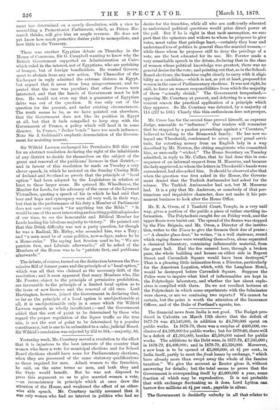Mr. E. A. Owen, of 1 Tanfield Court, Temple, in
a very nalf way, gives a portion of the public a piece of rather startling in- formation. The Polytechnic caught fire on Friday week, and the upper floors were burnt out. The spread of the flames was stopped by the Fire Brigade, and Mr. Owen, a Director of the institu- tion, mites to the Times to give the firemen their due of praise —" A slender glass door," he writes, "in a well staircase, round. which raging flames were wreathing themselves, alone separated. a chemical laboratory, containing inflammable material, from the great hall. Had the fire entered here, through a broken pane, the whole building and houses on either side in Regent Street and Cavendish Square would have been destroyed." That is a pleasing little intimation from a Director, particularly for the American Legation, which, with the Longhorn Hotel, would be destroyed before Cavendish Square. Suppose the Police were to inquire what kind of inflammables are kept in the Polytechnic laboratory, and whether the law about explo- sives is complied with there. Do we not recollect lectures at the Polytechnic in which some experiments with the fulminates were shown, or are we confusing two reports? We cannot be certain, but the point is worth the attention of the Insurance Offices, and of the Duke of Portland's agents, too.


































 Previous page
Previous page